Global Hospitality and Tourism: Airbnb's Impact and Strategies Report
VerifiedAdded on 2021/02/19
|11
|2604
|17
Report
AI Summary
This report provides a comprehensive analysis of Airbnb's success and its disruptive impact on the global hospitality industry, particularly the hotel sector. It begins with an overview of Airbnb, its business model, and its rapid growth, highlighting factors such as the sharing economy, disruptive innovation, and occupancy rates. The report then delves into the specific ways Airbnb has affected the hotel industry, including market share, revenue losses, and changing consumer behavior. Furthermore, the report evaluates strategic approaches that hotels can adopt to mitigate Airbnb's influence, such as product differentiation, enhancing customer experiences, and utilizing the TOWS matrix to identify strengths, weaknesses, opportunities, and threats. The conclusion summarizes the key findings and offers insights into the future of the hospitality landscape in the face of evolving market dynamics.
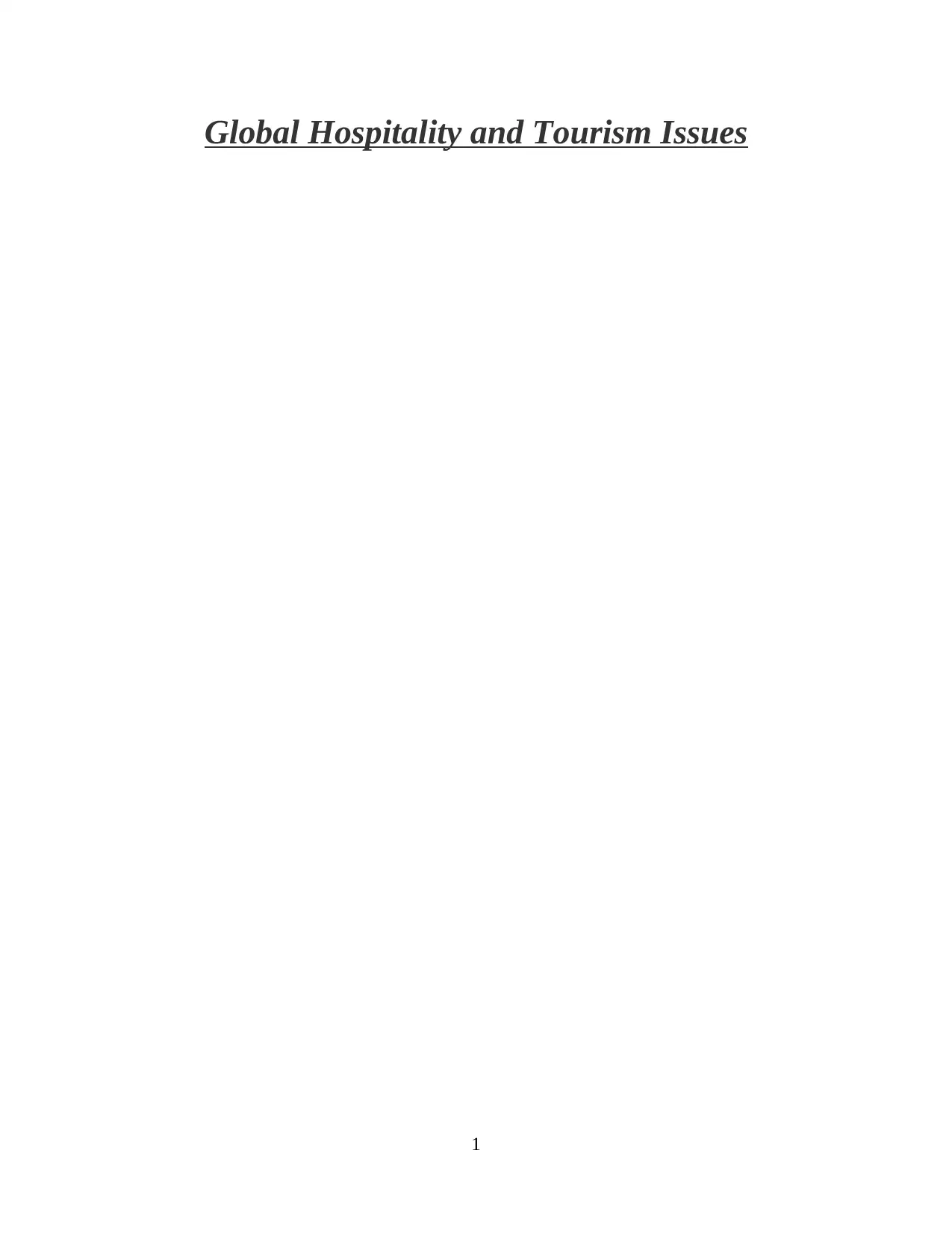
Global Hospitality and Tourism Issues
1
1
Paraphrase This Document
Need a fresh take? Get an instant paraphrase of this document with our AI Paraphraser
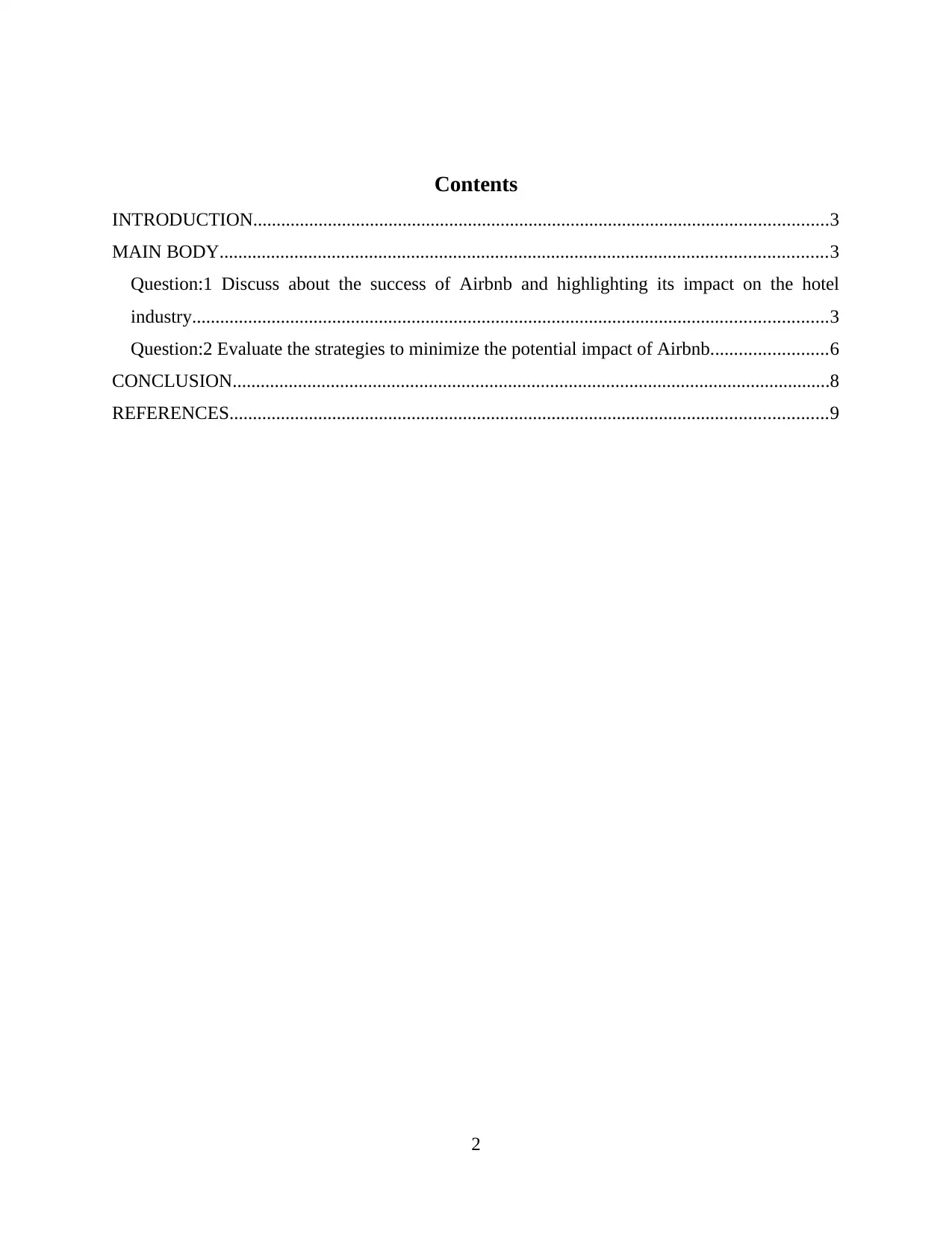
Contents
INTRODUCTION...........................................................................................................................3
MAIN BODY..................................................................................................................................3
Question:1 Discuss about the success of Airbnb and highlighting its impact on the hotel
industry........................................................................................................................................3
Question:2 Evaluate the strategies to minimize the potential impact of Airbnb.........................6
CONCLUSION................................................................................................................................8
REFERENCES................................................................................................................................9
2
INTRODUCTION...........................................................................................................................3
MAIN BODY..................................................................................................................................3
Question:1 Discuss about the success of Airbnb and highlighting its impact on the hotel
industry........................................................................................................................................3
Question:2 Evaluate the strategies to minimize the potential impact of Airbnb.........................6
CONCLUSION................................................................................................................................8
REFERENCES................................................................................................................................9
2
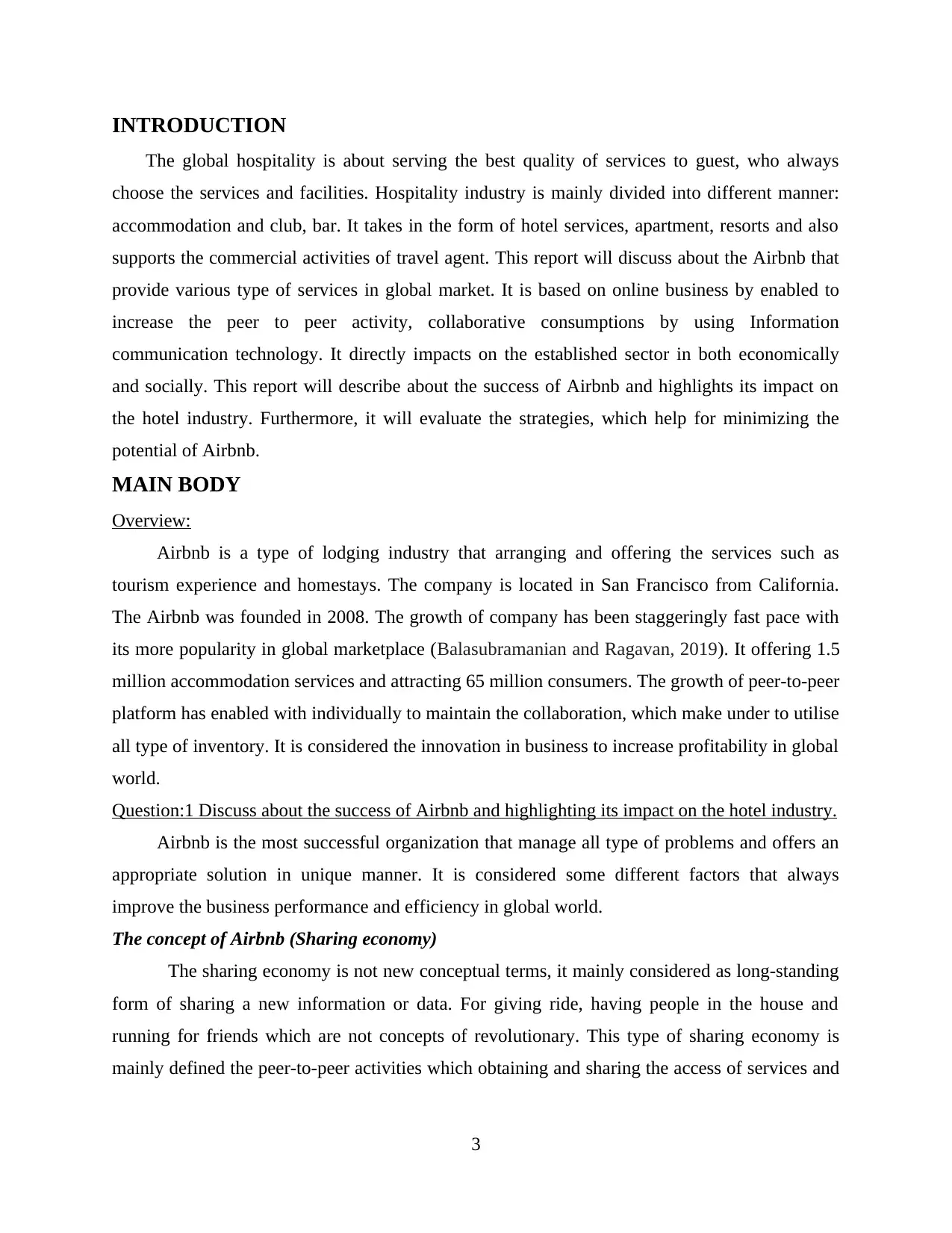
INTRODUCTION
The global hospitality is about serving the best quality of services to guest, who always
choose the services and facilities. Hospitality industry is mainly divided into different manner:
accommodation and club, bar. It takes in the form of hotel services, apartment, resorts and also
supports the commercial activities of travel agent. This report will discuss about the Airbnb that
provide various type of services in global market. It is based on online business by enabled to
increase the peer to peer activity, collaborative consumptions by using Information
communication technology. It directly impacts on the established sector in both economically
and socially. This report will describe about the success of Airbnb and highlights its impact on
the hotel industry. Furthermore, it will evaluate the strategies, which help for minimizing the
potential of Airbnb.
MAIN BODY
Overview:
Airbnb is a type of lodging industry that arranging and offering the services such as
tourism experience and homestays. The company is located in San Francisco from California.
The Airbnb was founded in 2008. The growth of company has been staggeringly fast pace with
its more popularity in global marketplace (Balasubramanian and Ragavan, 2019). It offering 1.5
million accommodation services and attracting 65 million consumers. The growth of peer-to-peer
platform has enabled with individually to maintain the collaboration, which make under to utilise
all type of inventory. It is considered the innovation in business to increase profitability in global
world.
Question:1 Discuss about the success of Airbnb and highlighting its impact on the hotel industry.
Airbnb is the most successful organization that manage all type of problems and offers an
appropriate solution in unique manner. It is considered some different factors that always
improve the business performance and efficiency in global world.
The concept of Airbnb (Sharing economy)
The sharing economy is not new conceptual terms, it mainly considered as long-standing
form of sharing a new information or data. For giving ride, having people in the house and
running for friends which are not concepts of revolutionary. This type of sharing economy is
mainly defined the peer-to-peer activities which obtaining and sharing the access of services and
3
The global hospitality is about serving the best quality of services to guest, who always
choose the services and facilities. Hospitality industry is mainly divided into different manner:
accommodation and club, bar. It takes in the form of hotel services, apartment, resorts and also
supports the commercial activities of travel agent. This report will discuss about the Airbnb that
provide various type of services in global market. It is based on online business by enabled to
increase the peer to peer activity, collaborative consumptions by using Information
communication technology. It directly impacts on the established sector in both economically
and socially. This report will describe about the success of Airbnb and highlights its impact on
the hotel industry. Furthermore, it will evaluate the strategies, which help for minimizing the
potential of Airbnb.
MAIN BODY
Overview:
Airbnb is a type of lodging industry that arranging and offering the services such as
tourism experience and homestays. The company is located in San Francisco from California.
The Airbnb was founded in 2008. The growth of company has been staggeringly fast pace with
its more popularity in global marketplace (Balasubramanian and Ragavan, 2019). It offering 1.5
million accommodation services and attracting 65 million consumers. The growth of peer-to-peer
platform has enabled with individually to maintain the collaboration, which make under to utilise
all type of inventory. It is considered the innovation in business to increase profitability in global
world.
Question:1 Discuss about the success of Airbnb and highlighting its impact on the hotel industry.
Airbnb is the most successful organization that manage all type of problems and offers an
appropriate solution in unique manner. It is considered some different factors that always
improve the business performance and efficiency in global world.
The concept of Airbnb (Sharing economy)
The sharing economy is not new conceptual terms, it mainly considered as long-standing
form of sharing a new information or data. For giving ride, having people in the house and
running for friends which are not concepts of revolutionary. This type of sharing economy is
mainly defined the peer-to-peer activities which obtaining and sharing the access of services and
3
⊘ This is a preview!⊘
Do you want full access?
Subscribe today to unlock all pages.

Trusted by 1+ million students worldwide
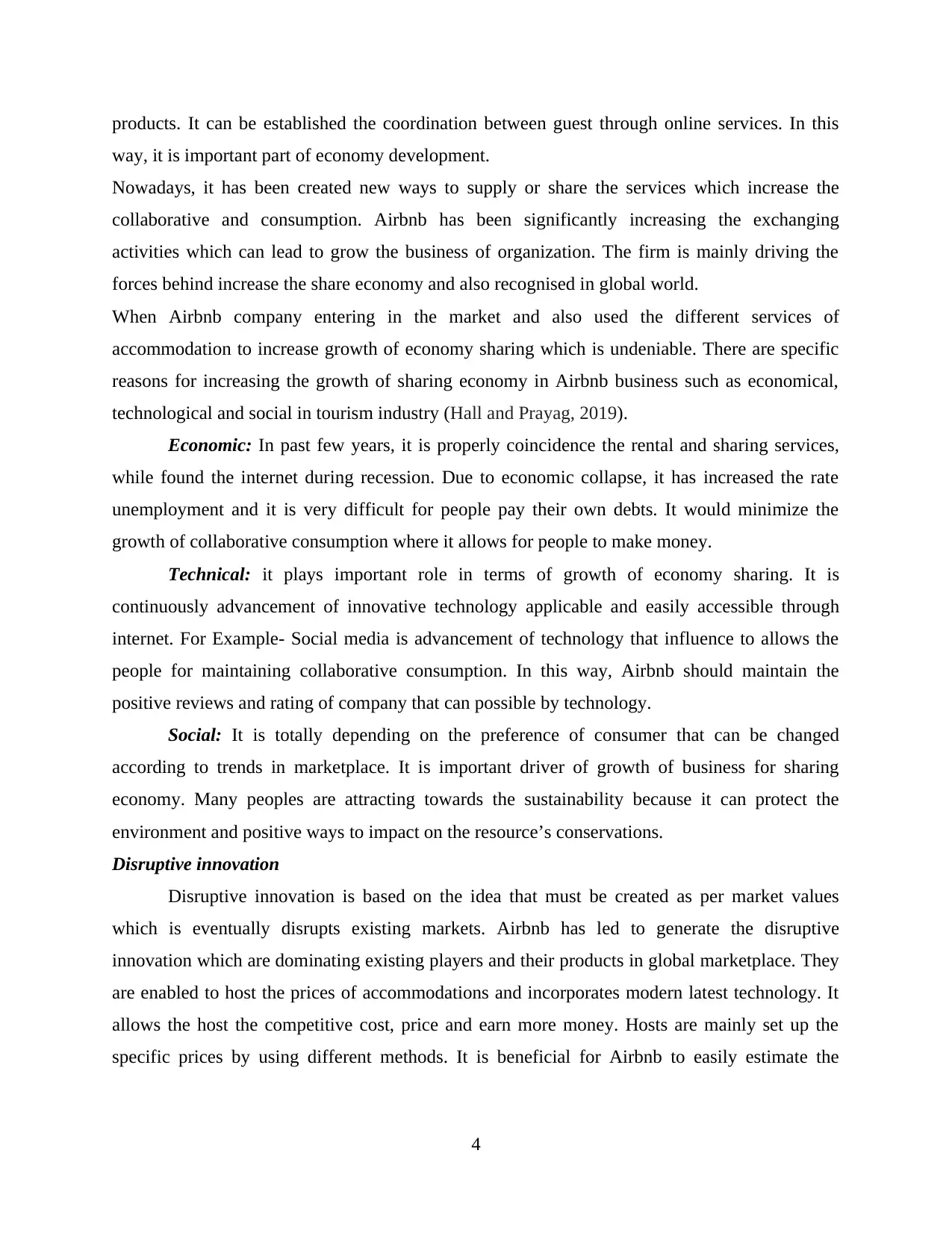
products. It can be established the coordination between guest through online services. In this
way, it is important part of economy development.
Nowadays, it has been created new ways to supply or share the services which increase the
collaborative and consumption. Airbnb has been significantly increasing the exchanging
activities which can lead to grow the business of organization. The firm is mainly driving the
forces behind increase the share economy and also recognised in global world.
When Airbnb company entering in the market and also used the different services of
accommodation to increase growth of economy sharing which is undeniable. There are specific
reasons for increasing the growth of sharing economy in Airbnb business such as economical,
technological and social in tourism industry (Hall and Prayag, 2019).
Economic: In past few years, it is properly coincidence the rental and sharing services,
while found the internet during recession. Due to economic collapse, it has increased the rate
unemployment and it is very difficult for people pay their own debts. It would minimize the
growth of collaborative consumption where it allows for people to make money.
Technical: it plays important role in terms of growth of economy sharing. It is
continuously advancement of innovative technology applicable and easily accessible through
internet. For Example- Social media is advancement of technology that influence to allows the
people for maintaining collaborative consumption. In this way, Airbnb should maintain the
positive reviews and rating of company that can possible by technology.
Social: It is totally depending on the preference of consumer that can be changed
according to trends in marketplace. It is important driver of growth of business for sharing
economy. Many peoples are attracting towards the sustainability because it can protect the
environment and positive ways to impact on the resource’s conservations.
Disruptive innovation
Disruptive innovation is based on the idea that must be created as per market values
which is eventually disrupts existing markets. Airbnb has led to generate the disruptive
innovation which are dominating existing players and their products in global marketplace. They
are enabled to host the prices of accommodations and incorporates modern latest technology. It
allows the host the competitive cost, price and earn more money. Hosts are mainly set up the
specific prices by using different methods. It is beneficial for Airbnb to easily estimate the
4
way, it is important part of economy development.
Nowadays, it has been created new ways to supply or share the services which increase the
collaborative and consumption. Airbnb has been significantly increasing the exchanging
activities which can lead to grow the business of organization. The firm is mainly driving the
forces behind increase the share economy and also recognised in global world.
When Airbnb company entering in the market and also used the different services of
accommodation to increase growth of economy sharing which is undeniable. There are specific
reasons for increasing the growth of sharing economy in Airbnb business such as economical,
technological and social in tourism industry (Hall and Prayag, 2019).
Economic: In past few years, it is properly coincidence the rental and sharing services,
while found the internet during recession. Due to economic collapse, it has increased the rate
unemployment and it is very difficult for people pay their own debts. It would minimize the
growth of collaborative consumption where it allows for people to make money.
Technical: it plays important role in terms of growth of economy sharing. It is
continuously advancement of innovative technology applicable and easily accessible through
internet. For Example- Social media is advancement of technology that influence to allows the
people for maintaining collaborative consumption. In this way, Airbnb should maintain the
positive reviews and rating of company that can possible by technology.
Social: It is totally depending on the preference of consumer that can be changed
according to trends in marketplace. It is important driver of growth of business for sharing
economy. Many peoples are attracting towards the sustainability because it can protect the
environment and positive ways to impact on the resource’s conservations.
Disruptive innovation
Disruptive innovation is based on the idea that must be created as per market values
which is eventually disrupts existing markets. Airbnb has led to generate the disruptive
innovation which are dominating existing players and their products in global marketplace. They
are enabled to host the prices of accommodations and incorporates modern latest technology. It
allows the host the competitive cost, price and earn more money. Hosts are mainly set up the
specific prices by using different methods. It is beneficial for Airbnb to easily estimate the
4
Paraphrase This Document
Need a fresh take? Get an instant paraphrase of this document with our AI Paraphraser
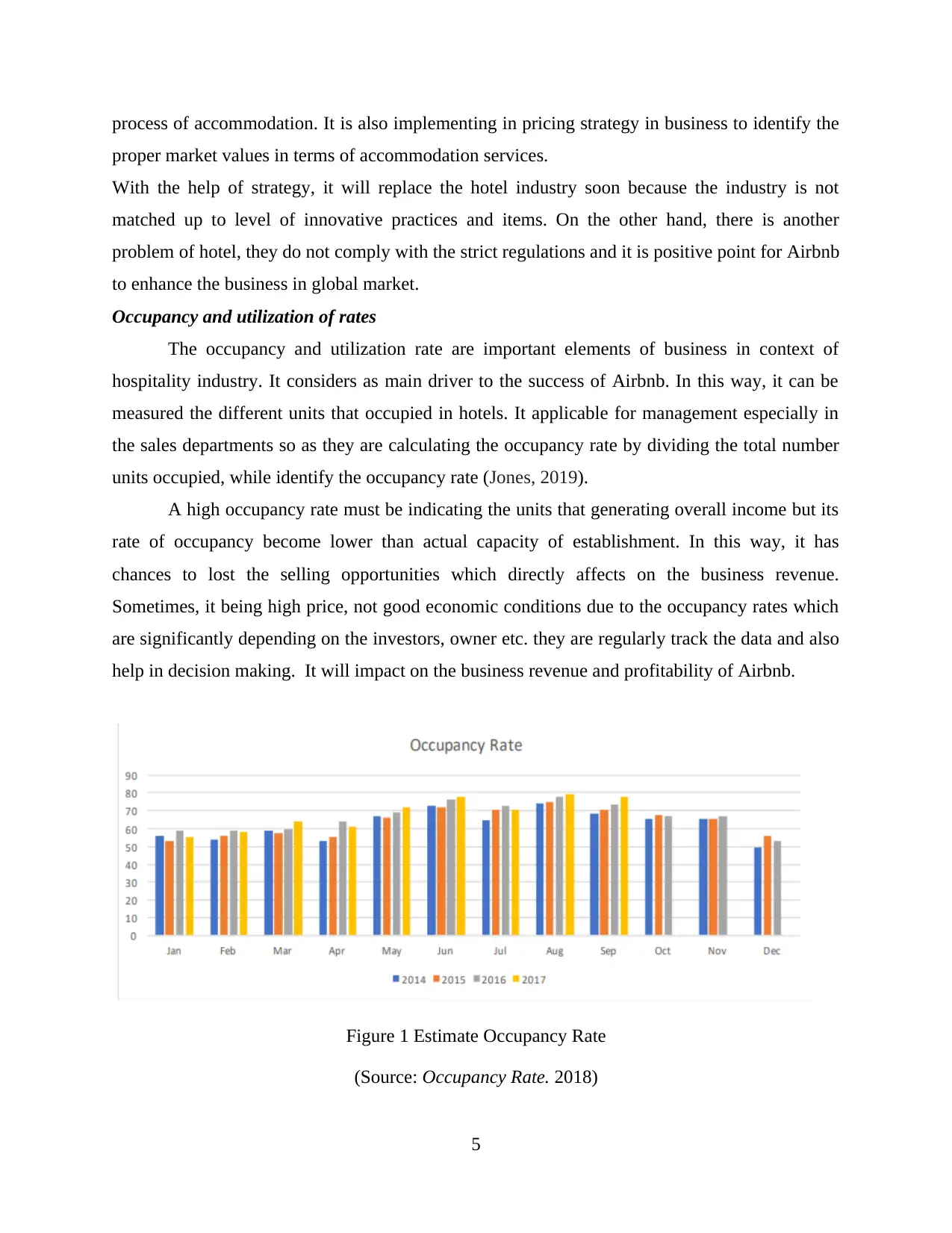
process of accommodation. It is also implementing in pricing strategy in business to identify the
proper market values in terms of accommodation services.
With the help of strategy, it will replace the hotel industry soon because the industry is not
matched up to level of innovative practices and items. On the other hand, there is another
problem of hotel, they do not comply with the strict regulations and it is positive point for Airbnb
to enhance the business in global market.
Occupancy and utilization of rates
The occupancy and utilization rate are important elements of business in context of
hospitality industry. It considers as main driver to the success of Airbnb. In this way, it can be
measured the different units that occupied in hotels. It applicable for management especially in
the sales departments so as they are calculating the occupancy rate by dividing the total number
units occupied, while identify the occupancy rate (Jones, 2019).
A high occupancy rate must be indicating the units that generating overall income but its
rate of occupancy become lower than actual capacity of establishment. In this way, it has
chances to lost the selling opportunities which directly affects on the business revenue.
Sometimes, it being high price, not good economic conditions due to the occupancy rates which
are significantly depending on the investors, owner etc. they are regularly track the data and also
help in decision making. It will impact on the business revenue and profitability of Airbnb.
Figure 1 Estimate Occupancy Rate
(Source: Occupancy Rate. 2018)
5
proper market values in terms of accommodation services.
With the help of strategy, it will replace the hotel industry soon because the industry is not
matched up to level of innovative practices and items. On the other hand, there is another
problem of hotel, they do not comply with the strict regulations and it is positive point for Airbnb
to enhance the business in global market.
Occupancy and utilization of rates
The occupancy and utilization rate are important elements of business in context of
hospitality industry. It considers as main driver to the success of Airbnb. In this way, it can be
measured the different units that occupied in hotels. It applicable for management especially in
the sales departments so as they are calculating the occupancy rate by dividing the total number
units occupied, while identify the occupancy rate (Jones, 2019).
A high occupancy rate must be indicating the units that generating overall income but its
rate of occupancy become lower than actual capacity of establishment. In this way, it has
chances to lost the selling opportunities which directly affects on the business revenue.
Sometimes, it being high price, not good economic conditions due to the occupancy rates which
are significantly depending on the investors, owner etc. they are regularly track the data and also
help in decision making. It will impact on the business revenue and profitability of Airbnb.
Figure 1 Estimate Occupancy Rate
(Source: Occupancy Rate. 2018)
5
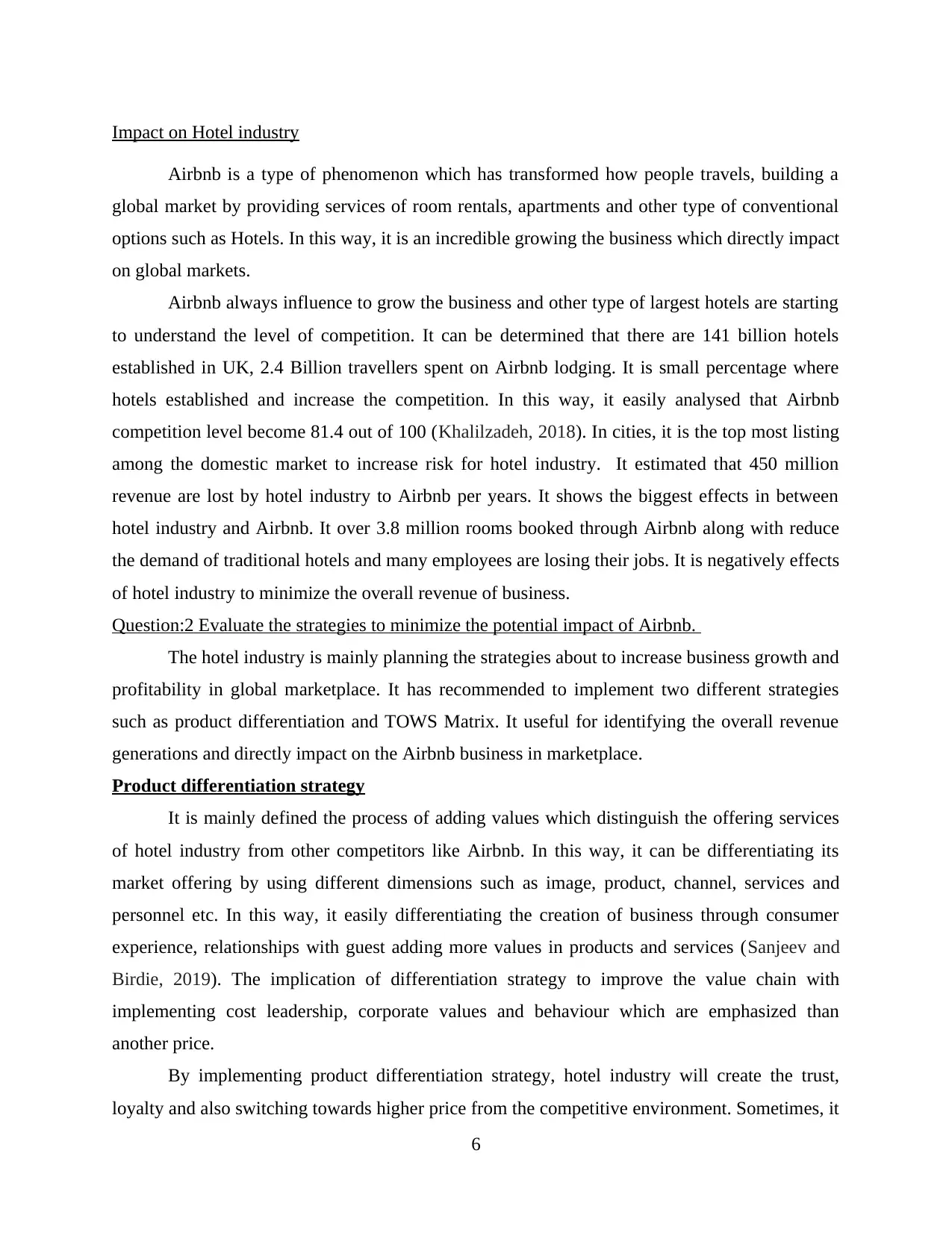
Impact on Hotel industry
Airbnb is a type of phenomenon which has transformed how people travels, building a
global market by providing services of room rentals, apartments and other type of conventional
options such as Hotels. In this way, it is an incredible growing the business which directly impact
on global markets.
Airbnb always influence to grow the business and other type of largest hotels are starting
to understand the level of competition. It can be determined that there are 141 billion hotels
established in UK, 2.4 Billion travellers spent on Airbnb lodging. It is small percentage where
hotels established and increase the competition. In this way, it easily analysed that Airbnb
competition level become 81.4 out of 100 (Khalilzadeh, 2018). In cities, it is the top most listing
among the domestic market to increase risk for hotel industry. It estimated that 450 million
revenue are lost by hotel industry to Airbnb per years. It shows the biggest effects in between
hotel industry and Airbnb. It over 3.8 million rooms booked through Airbnb along with reduce
the demand of traditional hotels and many employees are losing their jobs. It is negatively effects
of hotel industry to minimize the overall revenue of business.
Question:2 Evaluate the strategies to minimize the potential impact of Airbnb.
The hotel industry is mainly planning the strategies about to increase business growth and
profitability in global marketplace. It has recommended to implement two different strategies
such as product differentiation and TOWS Matrix. It useful for identifying the overall revenue
generations and directly impact on the Airbnb business in marketplace.
Product differentiation strategy
It is mainly defined the process of adding values which distinguish the offering services
of hotel industry from other competitors like Airbnb. In this way, it can be differentiating its
market offering by using different dimensions such as image, product, channel, services and
personnel etc. In this way, it easily differentiating the creation of business through consumer
experience, relationships with guest adding more values in products and services (Sanjeev and
Birdie, 2019). The implication of differentiation strategy to improve the value chain with
implementing cost leadership, corporate values and behaviour which are emphasized than
another price.
By implementing product differentiation strategy, hotel industry will create the trust,
loyalty and also switching towards higher price from the competitive environment. Sometimes, it
6
Airbnb is a type of phenomenon which has transformed how people travels, building a
global market by providing services of room rentals, apartments and other type of conventional
options such as Hotels. In this way, it is an incredible growing the business which directly impact
on global markets.
Airbnb always influence to grow the business and other type of largest hotels are starting
to understand the level of competition. It can be determined that there are 141 billion hotels
established in UK, 2.4 Billion travellers spent on Airbnb lodging. It is small percentage where
hotels established and increase the competition. In this way, it easily analysed that Airbnb
competition level become 81.4 out of 100 (Khalilzadeh, 2018). In cities, it is the top most listing
among the domestic market to increase risk for hotel industry. It estimated that 450 million
revenue are lost by hotel industry to Airbnb per years. It shows the biggest effects in between
hotel industry and Airbnb. It over 3.8 million rooms booked through Airbnb along with reduce
the demand of traditional hotels and many employees are losing their jobs. It is negatively effects
of hotel industry to minimize the overall revenue of business.
Question:2 Evaluate the strategies to minimize the potential impact of Airbnb.
The hotel industry is mainly planning the strategies about to increase business growth and
profitability in global marketplace. It has recommended to implement two different strategies
such as product differentiation and TOWS Matrix. It useful for identifying the overall revenue
generations and directly impact on the Airbnb business in marketplace.
Product differentiation strategy
It is mainly defined the process of adding values which distinguish the offering services
of hotel industry from other competitors like Airbnb. In this way, it can be differentiating its
market offering by using different dimensions such as image, product, channel, services and
personnel etc. In this way, it easily differentiating the creation of business through consumer
experience, relationships with guest adding more values in products and services (Sanjeev and
Birdie, 2019). The implication of differentiation strategy to improve the value chain with
implementing cost leadership, corporate values and behaviour which are emphasized than
another price.
By implementing product differentiation strategy, hotel industry will create the trust,
loyalty and also switching towards higher price from the competitive environment. Sometimes, it
6
⊘ This is a preview!⊘
Do you want full access?
Subscribe today to unlock all pages.

Trusted by 1+ million students worldwide
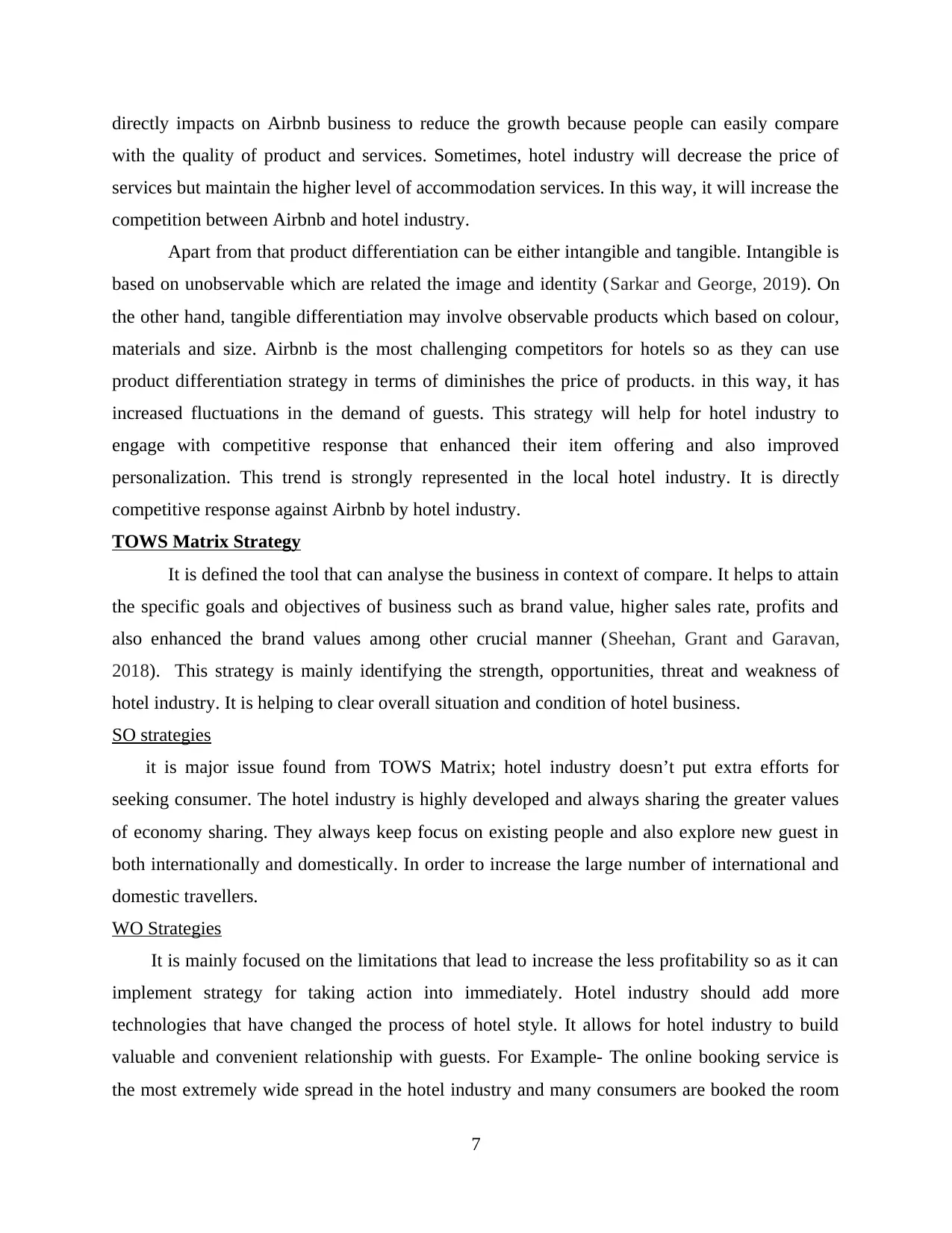
directly impacts on Airbnb business to reduce the growth because people can easily compare
with the quality of product and services. Sometimes, hotel industry will decrease the price of
services but maintain the higher level of accommodation services. In this way, it will increase the
competition between Airbnb and hotel industry.
Apart from that product differentiation can be either intangible and tangible. Intangible is
based on unobservable which are related the image and identity (Sarkar and George, 2019). On
the other hand, tangible differentiation may involve observable products which based on colour,
materials and size. Airbnb is the most challenging competitors for hotels so as they can use
product differentiation strategy in terms of diminishes the price of products. in this way, it has
increased fluctuations in the demand of guests. This strategy will help for hotel industry to
engage with competitive response that enhanced their item offering and also improved
personalization. This trend is strongly represented in the local hotel industry. It is directly
competitive response against Airbnb by hotel industry.
TOWS Matrix Strategy
It is defined the tool that can analyse the business in context of compare. It helps to attain
the specific goals and objectives of business such as brand value, higher sales rate, profits and
also enhanced the brand values among other crucial manner (Sheehan, Grant and Garavan,
2018). This strategy is mainly identifying the strength, opportunities, threat and weakness of
hotel industry. It is helping to clear overall situation and condition of hotel business.
SO strategies
it is major issue found from TOWS Matrix; hotel industry doesn’t put extra efforts for
seeking consumer. The hotel industry is highly developed and always sharing the greater values
of economy sharing. They always keep focus on existing people and also explore new guest in
both internationally and domestically. In order to increase the large number of international and
domestic travellers.
WO Strategies
It is mainly focused on the limitations that lead to increase the less profitability so as it can
implement strategy for taking action into immediately. Hotel industry should add more
technologies that have changed the process of hotel style. It allows for hotel industry to build
valuable and convenient relationship with guests. For Example- The online booking service is
the most extremely wide spread in the hotel industry and many consumers are booked the room
7
with the quality of product and services. Sometimes, hotel industry will decrease the price of
services but maintain the higher level of accommodation services. In this way, it will increase the
competition between Airbnb and hotel industry.
Apart from that product differentiation can be either intangible and tangible. Intangible is
based on unobservable which are related the image and identity (Sarkar and George, 2019). On
the other hand, tangible differentiation may involve observable products which based on colour,
materials and size. Airbnb is the most challenging competitors for hotels so as they can use
product differentiation strategy in terms of diminishes the price of products. in this way, it has
increased fluctuations in the demand of guests. This strategy will help for hotel industry to
engage with competitive response that enhanced their item offering and also improved
personalization. This trend is strongly represented in the local hotel industry. It is directly
competitive response against Airbnb by hotel industry.
TOWS Matrix Strategy
It is defined the tool that can analyse the business in context of compare. It helps to attain
the specific goals and objectives of business such as brand value, higher sales rate, profits and
also enhanced the brand values among other crucial manner (Sheehan, Grant and Garavan,
2018). This strategy is mainly identifying the strength, opportunities, threat and weakness of
hotel industry. It is helping to clear overall situation and condition of hotel business.
SO strategies
it is major issue found from TOWS Matrix; hotel industry doesn’t put extra efforts for
seeking consumer. The hotel industry is highly developed and always sharing the greater values
of economy sharing. They always keep focus on existing people and also explore new guest in
both internationally and domestically. In order to increase the large number of international and
domestic travellers.
WO Strategies
It is mainly focused on the limitations that lead to increase the less profitability so as it can
implement strategy for taking action into immediately. Hotel industry should add more
technologies that have changed the process of hotel style. It allows for hotel industry to build
valuable and convenient relationship with guests. For Example- The online booking service is
the most extremely wide spread in the hotel industry and many consumers are booked the room
7
Paraphrase This Document
Need a fresh take? Get an instant paraphrase of this document with our AI Paraphraser
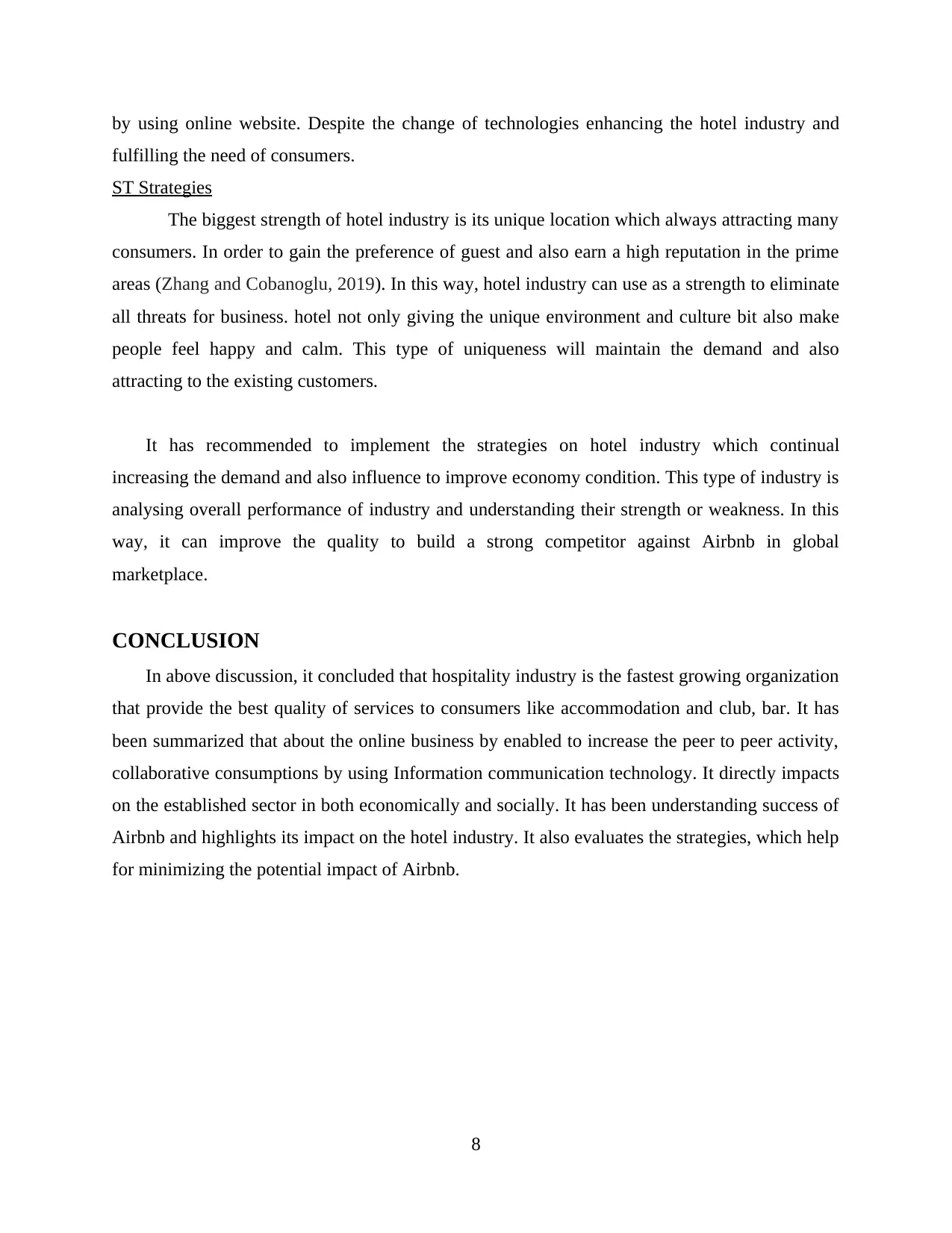
by using online website. Despite the change of technologies enhancing the hotel industry and
fulfilling the need of consumers.
ST Strategies
The biggest strength of hotel industry is its unique location which always attracting many
consumers. In order to gain the preference of guest and also earn a high reputation in the prime
areas (Zhang and Cobanoglu, 2019). In this way, hotel industry can use as a strength to eliminate
all threats for business. hotel not only giving the unique environment and culture bit also make
people feel happy and calm. This type of uniqueness will maintain the demand and also
attracting to the existing customers.
It has recommended to implement the strategies on hotel industry which continual
increasing the demand and also influence to improve economy condition. This type of industry is
analysing overall performance of industry and understanding their strength or weakness. In this
way, it can improve the quality to build a strong competitor against Airbnb in global
marketplace.
CONCLUSION
In above discussion, it concluded that hospitality industry is the fastest growing organization
that provide the best quality of services to consumers like accommodation and club, bar. It has
been summarized that about the online business by enabled to increase the peer to peer activity,
collaborative consumptions by using Information communication technology. It directly impacts
on the established sector in both economically and socially. It has been understanding success of
Airbnb and highlights its impact on the hotel industry. It also evaluates the strategies, which help
for minimizing the potential impact of Airbnb.
8
fulfilling the need of consumers.
ST Strategies
The biggest strength of hotel industry is its unique location which always attracting many
consumers. In order to gain the preference of guest and also earn a high reputation in the prime
areas (Zhang and Cobanoglu, 2019). In this way, hotel industry can use as a strength to eliminate
all threats for business. hotel not only giving the unique environment and culture bit also make
people feel happy and calm. This type of uniqueness will maintain the demand and also
attracting to the existing customers.
It has recommended to implement the strategies on hotel industry which continual
increasing the demand and also influence to improve economy condition. This type of industry is
analysing overall performance of industry and understanding their strength or weakness. In this
way, it can improve the quality to build a strong competitor against Airbnb in global
marketplace.
CONCLUSION
In above discussion, it concluded that hospitality industry is the fastest growing organization
that provide the best quality of services to consumers like accommodation and club, bar. It has
been summarized that about the online business by enabled to increase the peer to peer activity,
collaborative consumptions by using Information communication technology. It directly impacts
on the established sector in both economically and socially. It has been understanding success of
Airbnb and highlights its impact on the hotel industry. It also evaluates the strategies, which help
for minimizing the potential impact of Airbnb.
8
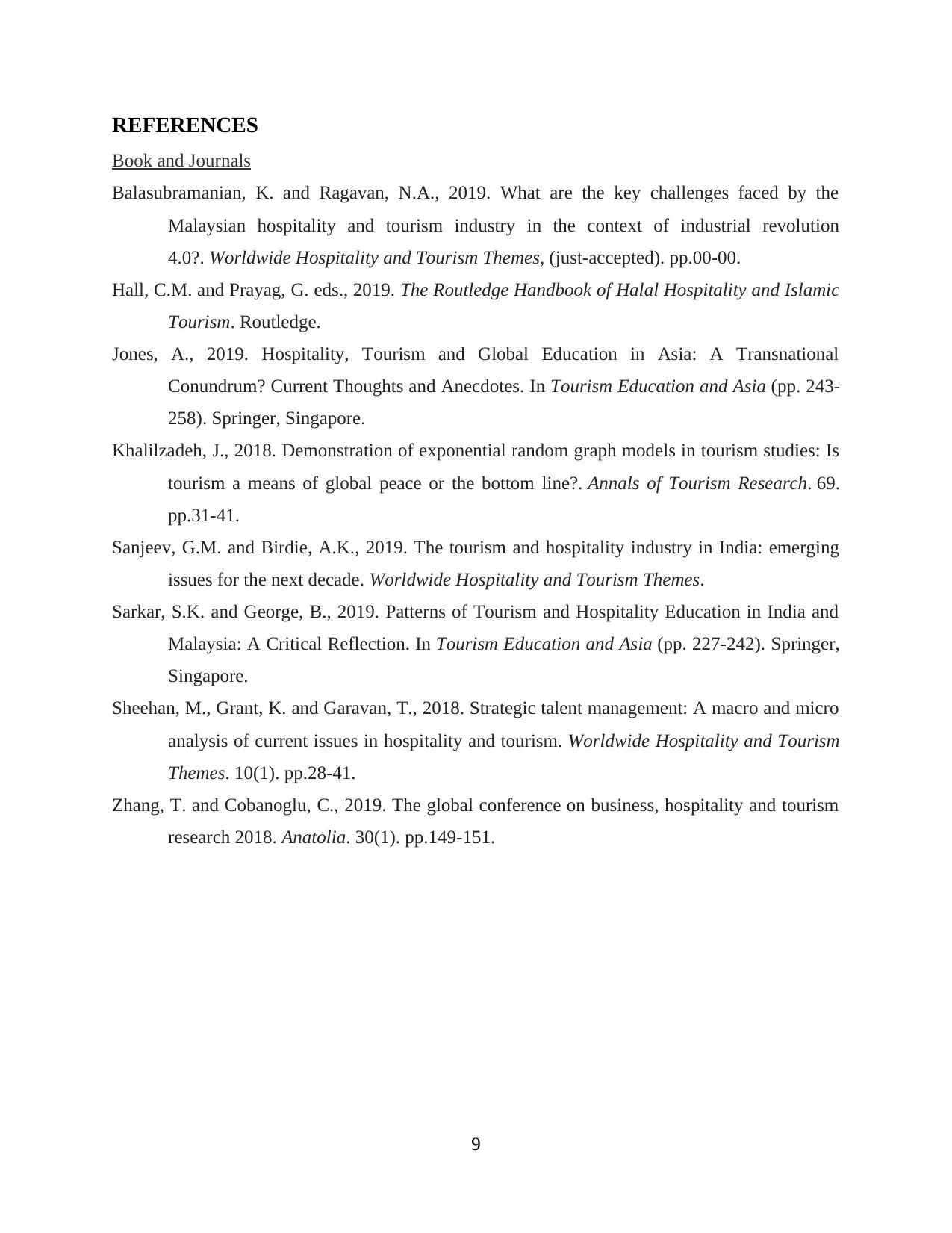
REFERENCES
Book and Journals
Balasubramanian, K. and Ragavan, N.A., 2019. What are the key challenges faced by the
Malaysian hospitality and tourism industry in the context of industrial revolution
4.0?. Worldwide Hospitality and Tourism Themes, (just-accepted). pp.00-00.
Hall, C.M. and Prayag, G. eds., 2019. The Routledge Handbook of Halal Hospitality and Islamic
Tourism. Routledge.
Jones, A., 2019. Hospitality, Tourism and Global Education in Asia: A Transnational
Conundrum? Current Thoughts and Anecdotes. In Tourism Education and Asia (pp. 243-
258). Springer, Singapore.
Khalilzadeh, J., 2018. Demonstration of exponential random graph models in tourism studies: Is
tourism a means of global peace or the bottom line?. Annals of Tourism Research. 69.
pp.31-41.
Sanjeev, G.M. and Birdie, A.K., 2019. The tourism and hospitality industry in India: emerging
issues for the next decade. Worldwide Hospitality and Tourism Themes.
Sarkar, S.K. and George, B., 2019. Patterns of Tourism and Hospitality Education in India and
Malaysia: A Critical Reflection. In Tourism Education and Asia (pp. 227-242). Springer,
Singapore.
Sheehan, M., Grant, K. and Garavan, T., 2018. Strategic talent management: A macro and micro
analysis of current issues in hospitality and tourism. Worldwide Hospitality and Tourism
Themes. 10(1). pp.28-41.
Zhang, T. and Cobanoglu, C., 2019. The global conference on business, hospitality and tourism
research 2018. Anatolia. 30(1). pp.149-151.
9
Book and Journals
Balasubramanian, K. and Ragavan, N.A., 2019. What are the key challenges faced by the
Malaysian hospitality and tourism industry in the context of industrial revolution
4.0?. Worldwide Hospitality and Tourism Themes, (just-accepted). pp.00-00.
Hall, C.M. and Prayag, G. eds., 2019. The Routledge Handbook of Halal Hospitality and Islamic
Tourism. Routledge.
Jones, A., 2019. Hospitality, Tourism and Global Education in Asia: A Transnational
Conundrum? Current Thoughts and Anecdotes. In Tourism Education and Asia (pp. 243-
258). Springer, Singapore.
Khalilzadeh, J., 2018. Demonstration of exponential random graph models in tourism studies: Is
tourism a means of global peace or the bottom line?. Annals of Tourism Research. 69.
pp.31-41.
Sanjeev, G.M. and Birdie, A.K., 2019. The tourism and hospitality industry in India: emerging
issues for the next decade. Worldwide Hospitality and Tourism Themes.
Sarkar, S.K. and George, B., 2019. Patterns of Tourism and Hospitality Education in India and
Malaysia: A Critical Reflection. In Tourism Education and Asia (pp. 227-242). Springer,
Singapore.
Sheehan, M., Grant, K. and Garavan, T., 2018. Strategic talent management: A macro and micro
analysis of current issues in hospitality and tourism. Worldwide Hospitality and Tourism
Themes. 10(1). pp.28-41.
Zhang, T. and Cobanoglu, C., 2019. The global conference on business, hospitality and tourism
research 2018. Anatolia. 30(1). pp.149-151.
9
⊘ This is a preview!⊘
Do you want full access?
Subscribe today to unlock all pages.

Trusted by 1+ million students worldwide
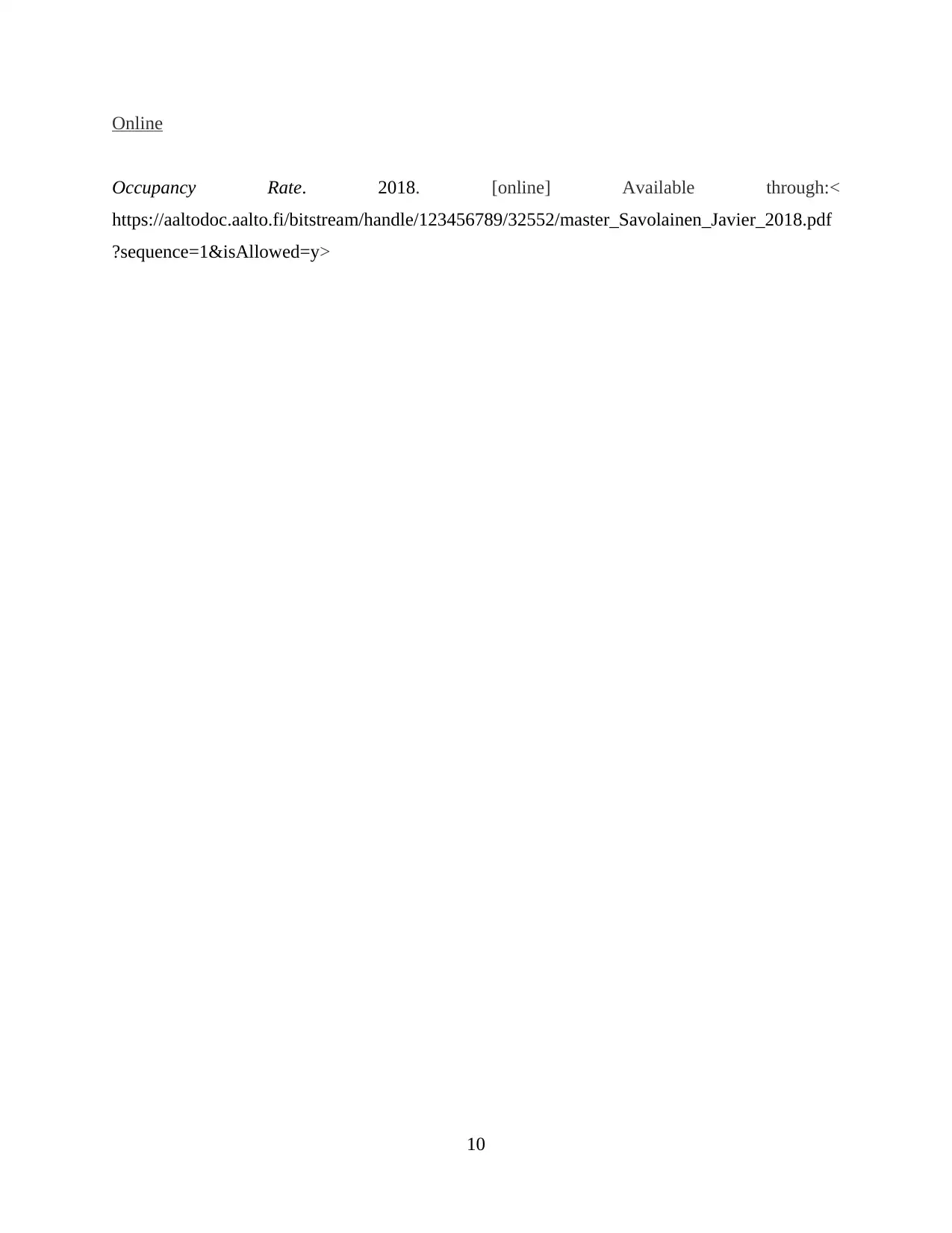
Online
Occupancy Rate. 2018. [online] Available through:<
https://aaltodoc.aalto.fi/bitstream/handle/123456789/32552/master_Savolainen_Javier_2018.pdf
?sequence=1&isAllowed=y>
10
Occupancy Rate. 2018. [online] Available through:<
https://aaltodoc.aalto.fi/bitstream/handle/123456789/32552/master_Savolainen_Javier_2018.pdf
?sequence=1&isAllowed=y>
10
Paraphrase This Document
Need a fresh take? Get an instant paraphrase of this document with our AI Paraphraser

11
1 out of 11
Related Documents
Your All-in-One AI-Powered Toolkit for Academic Success.
+13062052269
info@desklib.com
Available 24*7 on WhatsApp / Email
![[object Object]](/_next/static/media/star-bottom.7253800d.svg)
Unlock your academic potential
Copyright © 2020–2026 A2Z Services. All Rights Reserved. Developed and managed by ZUCOL.





